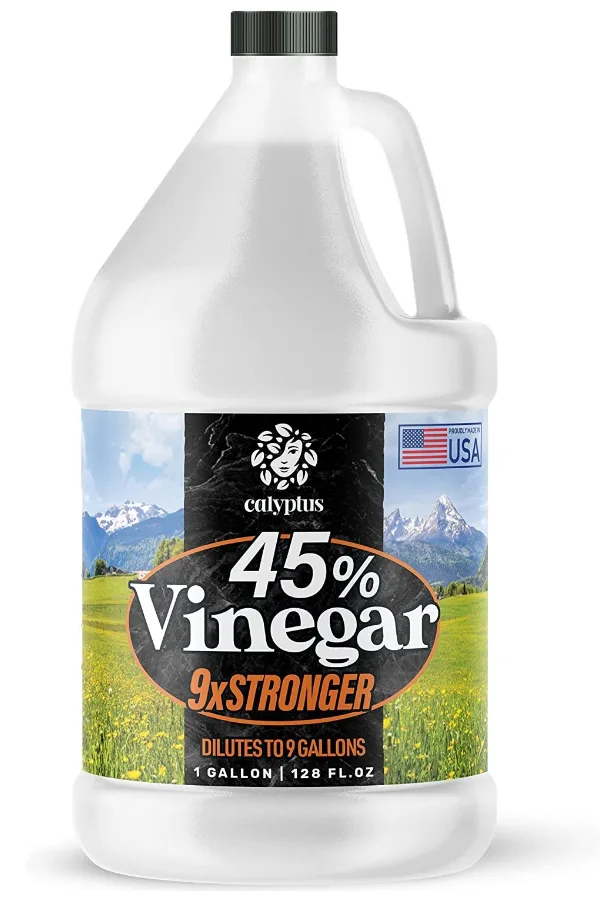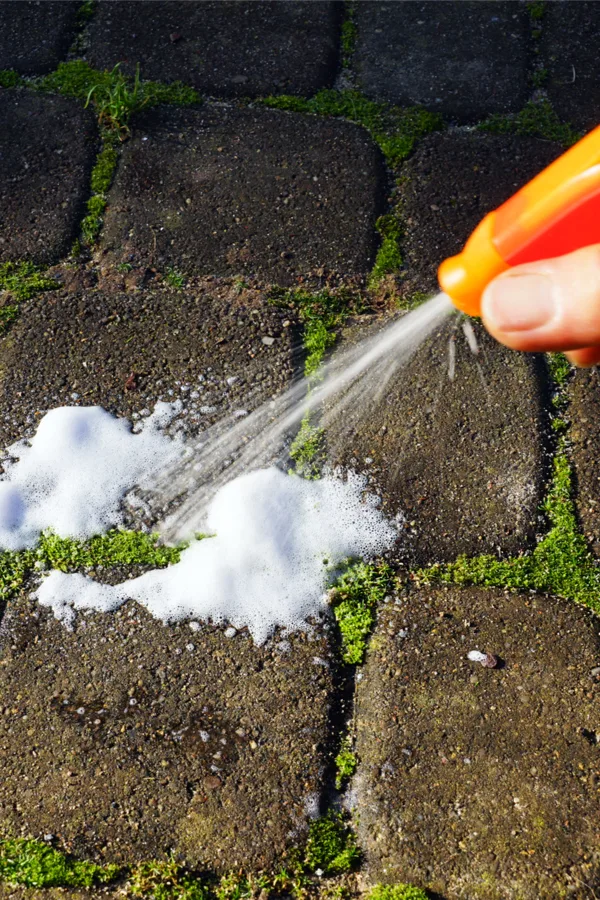If you are looking to avoid using harsh chemical sprays to kill the weeds in your driveway, patio, sidewalks, gravel or mulch playing areas, horticultural vinegar might just be the perfect solution!
Not only is it easy and effective to use, it’s also a much safer long-term choice for pets, wildlife and humans. But even more, for important insects and pollinators like bees and butterflies as well!
Many gardeners and homeowners now worry about the effects of using chemical sprays for weed control. Not just for residue left in the soil, but for the animals, insects and humans that come in contact with the sprays both before and after they dry.

That is exactly where vinegar, or more precisely horticultural vinegar can work wonders. The natural acid found in vinegar is quite effective in killing and controlling weeds. Especially when you apply it in a higher concentration of acidity like that which is found in horticultural vinegar.
How Vinegar Works To Kill Weeds – Using Horticultural Vinegar To Kill Weeds
Vinegar works in two distinct ways to eliminate weeds. First, the acid in vinegar kills the vegetation as it comes in contact with it. In essence, it burns the foliage.
But as the vinegar soaks into the soil, it also absorbs into the roots of the weeds. This not only burns the roots with acid, but settles into the soil to make it difficult for the roots to recover. As an added benefit, as the soil turns more acidic, it makes it difficult for future weeds to germinate as well.
This is exactly why it is important to only use vinegar to kill weeds in spaces where plants will never grow. One thing is for sure, vinegar should never be used in flowerbeds, lawns or garden spaces. (See: How To Eliminate Weeds From Flowerbeds)
Using an acidic solution such as vinegar in these areas can harm and injure nearby plants, and create long-term issues in the soil. But for driveways, pathways and brick or gravel patios – it is absolutely perfect!

Traditional Vinegar vs. Horticultural Vinegar
When it comes to using vinegar to kill weeds, there are two options. One is using traditional store-bought vinegar, or using higher strength horticultural vinegar.
Traditional vinegar found at your local grocery store will usually have an acidity of around 5%. Although this lower concentration can work to control emerging or tender young weeds, it is certainly no match for tough, mature and persistent weeds.
On the other hand, you can purchase horticultural vinegar with acidity concentrations between 20 and 45 percent. For most average weed issues, a 20 percent solution is quite effective for killing weeds.
With that said, a stronger solution is sometimes necessary for complete control. In fact, for hard to control weeds such as thistle, using horticultural vinegar at full strength (or at least at 30% acidity) for the first application is your best bet for success.
Selecting The Best Vinegar To Use For Weed Control
So which one is the best to use? It really comes down to where you will be using it, and what type of weeds you are attempting to kill off. Even though store bought vinegar will work on small weed problems, horticultural is usually your best bet for long term control.

You can dilute stronger solutions down with water to create a spray with a concentration of 15% to 20% acidity. That is usually enough to kill most average weeds. You can also use the horticultural vinegar at full strength for extremely stubborn and tough weed issues.
How To Apply – Using Horticultural Vinegar To Kill Weeds
Here is another advantage of using horticultural vinegar – with an all-liquid solution of vinegar, or with a water/vinegar mix, the clogging of your sprayer is never an issue. Not only does the pure liquid flow easily, the acidity in the vinegar helps to keep the spray nozzle clear and clean.
Before mixing or spraying any vinegar solution, it is important to take a few precautions. Remember that although vinegar is all-natural, it is still an acid.
As with any acid, it is important to take precautions to prevent burns to the skin and eyes. Especially if you are using the more potent acidic concentrations found in horticultural vinegar. Always use goggles and gloves to prevent burns to the eyes or skin. In addition, be sure to keep any vinegar solution stored away from children.

To apply, a hand-help pump spray bottle works best for small areas. For larger spaces such as driveways and walkways, a pump or backpack sprayer are the better choice. One thing is for sure, it can certainly help cover large spaces in quick fashion.
When To Spray – Using Horticultural Vinegar To Kill Weeds
Once your vinegar solution is ready to go and your protective gear is in place, it’s time to spray! The best time to spray vinegar for killing weeds is in the afternoon and on hot, wind-free sunny days.
The sun and heat help to accelerate the effectiveness of the acid in vinegar. They also help the vinegar absorb and kill weeds at a much higher rate. Avoid windy days as it can lift the spray to nearby vegetation, grass and flowerbeds, causing damage in the process.
Never spray when there is dew present or after a rain. This will only dilute the acidity level and make the solution much less effective. Spray so that you coat the foliage of the weeds completely. You do not have to douse or saturate the leaves, but make sure the foliage is wet.

How Fast Does Horticultural Vinegar Work? – Using Horticultural Vinegar To Kill Weeds
As for the speed of the solution’s effectiveness, it will depend on the weather conditions. Using an acidity solution of at least 15 percent on a warm sunny day, you will usually see the foliage start to wilt and die back in 24 hours.
On cooler days, it may take a bit more time to begin to take effect. If after five to seven days, there is still some green to the weeds, repeat the application for complete control.
Remember, the larger the weeds and roots, the longer it will take to get them under control. Once you have the area cleared of weeds, try to spray new weeds as they are just beginning to sprout. This will require less vinegar strength, and make the weed seedlings easy to control.
Here’s to controlling your weeds with vinegar this year. And to a safer, all-natural approach to gardening!
Follow Our Facebook Page For Great Gardening Tips And Advice! This Is My Garden Facebook Page
This Is My Garden is a garden website created by gardeners, for gardeners. Jim and Mary Competti have been writing gardening, DIY and recipe articles and books and speaking for over 15 years from their 46 acre Ohio farm. They publish three articles every week, 52 weeks a year. Sign up today to follow via email, or follow along!

